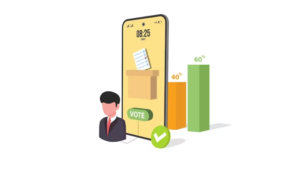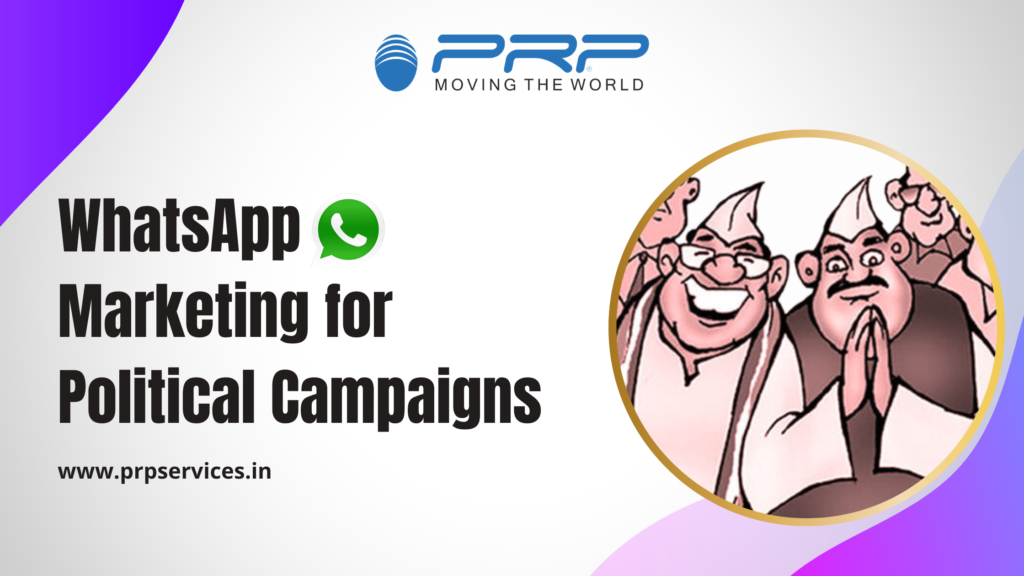Implementing WhatsApp Marketing for Lok Sabha Elections 2024 requires a strategic approach tailored to the unique dynamics of Indian politics. To begin, parties should focus on building opt-in lists of supporters eager to receive updates and messages via WhatsApp. These lists can be cultivated through diverse channels, including campaign websites, social media platforms, and offline events, with clear communication on the benefits of joining, such as exclusive updates or direct access to candidates. Segmentation of the audience based on demographics, location, and interests enhances the relevance of messages, ensuring maximum engagement.
As parties (Bharatiya Janata Party (BJP), Indian National Congress (INC), Aam Aadmi Party (AAP), Bahujan Samaj Party (BSP), and Samajwadi Party (SP) gear up for the Lok Sabha Elections 2024, strategic WhatsApp marketing can serve as a useful tool for connecting with voters and driving electoral success.
Understanding WhatsApp Marketing service:
WhatsApp is a globally popular messaging platform that claims over a billion active users across the world. Its widespread adoption can be held responsible for its simplicity, security, and versatility, allowing users to send text messages, voice notes, images, videos, and documents seamlessly. For political campaigns, WhatsApp serves as a valuable tool for communication, enabling candidates to connect with agents on a personal level and deliver their message directly to their smartphones. WhatsApp marketing in political campaigns involves using the platform’s features to engage with voters, Expand information, mobilize support, and drive meaningful action.
Benefits of WhatsApp Marketing in Election Campaigns:

1. Direct and Personalized Communication:
One of the primary advantages of WhatsApp marketing in political campaigns is the ability to establish direct and personalized communication channels with voters. Unlike traditional media outlets or middlemen, WhatsApp allows political candidates to communicate with voters on a one-on-one basis, Promoting a sense of approach. Through personalized messages, campaigns can address individual concerns, answer questions, and build genuine relationships with voters, thereby humanizing the campaign and increasing voter engagement.
2. Real-Time Updates and Information Dissemination:
In the fast world of politics, timely communication is essential for staying ahead of the turn. WhatsApp enables political campaigns to Expand real-time updates, announcements, and information to their supporters instantly. Whether it’s sharing details about campaign events, releasing policy proposals, or responding to breaking news, campaigns can keep voters informed and engaged every step of the way. This real-time communication supports transparency, builds credit, and allows campaigns to shape the narrative effectively.
3. Targeted Outreach and Segmentation:
WhatsApp marketing empowers political campaigns to conduct targeted outreach and segmentation, ensuring that messages are delivered to the most relevant audience. By segmenting their audience based on demographics, location, interests, or past interactions, campaigns can send targeted messages that Connect with each group. This personalized approach Maximizes the impact of campaign communications and increases the possibility of voter engagement and support.
4. Mobilization and Community Building:
WhatsApp serves as a powerful tool for mobilizing ground-level support and building communities around political campaigns. Campaigns can create group chats and communities where supporters can connect, collaborate, and take collective action. From organizing local events to coordinating door-to-door Publicity efforts, WhatsApp groups provide a platform for supporters to engage with the campaign and contribute to its success. This ground-level mobilization strengthens the campaign’s structure, increases its message, and drives meaningful change at the ground level.
5. Data Analytics and Performance Measurement:
Like any marketing strategy, measuring the effectiveness of WhatsApp marketing in political campaigns is essential for optimizing outreach efforts. WhatsApp provides valuable insights into user engagement, message open rates, and conversion rates, allowing campaigns to track the performance of their communications and adjust their strategies accordingly. This data-driven approach enables campaigns to identify trends, refine their messaging tactics, and allocate resources more effectively.
Challenges and Considerations:
While WhatsApp marketing offers numerous benefits for political campaigns, it also presents several challenges and considerations that must be addressed:
1. Privacy and Compliance:
Political campaigns must prioritize privacy and compliance with relevant regulations when using WhatsApp for marketing purposes. This includes obtaining consent before adding individuals to WhatsApp groups, providing clear opt-out options, and safeguarding personal data. Failure to Accept these principles can damage the campaign’s reputation and supporters.
2. Message stress:
Showering supporters with frequent messages on WhatsApp can lead to message Tiredness and discharge. Campaigns must strike a balance between staying connected with voters and overwhelming them with excessive communication. Utilizing broadcast lists wisely and providing valuable content can help lower the risk of message stress.
3. Misinformation and Disinformation:
WhatsApp has been fed up with issues of misinformation and disinformation, with false or misleading content spreading rapidly on the platform. Political campaigns must be sensible in engaging misinformation and ensuring the accuracy of the information they share on WhatsApp. Providing fact-checked information and encouraging critical thinking among supporters can help feedback on the spread of misinformation.
Strategies for Effective WhatsApp Marketing in Political Campaigns:

To maximize the impact of WhatsApp marketing in political campaigns, it is essential to adopt effective strategies and best practices:
1. Build Opt-In Lists:
Political campaigns should focus on building opt-in lists of supporters who are willing to receive updates and messages via WhatsApp. This can be achieved through various channels such as campaign websites, social media, or offline events. Communicate the value proposition of joining the WhatsApp group, whether it’s exclusive updates or direct access to the candidate.
2. Personalized Messaging:
Campaigns should lift the personal nature of WhatsApp to send personalized messages tailored to the interests and demographics of their audience. Whether it’s addressing specific local issues, sharing relevant policy proposals, or acknowledging individual supporters, personalized messaging supports a sense of connection and engagement.
3. Engage in Conversations:
Encourage supporters to engage in conversations, ask questions, and provide feedback on WhatsApp. WhatsApp allows for two-way interaction in real-time, providing an opportunity for campaigns to support meaningful dialogue with voters. This not only strengthens the bond between the campaign and its supporters but also provides valuable insights into voter sentiment and concerns.
4. Share Compelling Content:
Content is king in the realm of digital marketing, and WhatsApp is no exception. Campaigns should focus on creating and sharing compelling content that resonates with their audience. This could include videos, infographics, behind-the-scenes photos, live updates from campaign events, or interviews with the candidate. The key is to keep the content informative, engaging, and shareable.
5. Utilize Broadcast Lists Wisely:
While broadcast lists can be a powerful tool for reaching a large audience with a single message, they should be used carefully and strategically. shower supporters with frequent messages can lead to strain and disengagement. Instead, reserve broadcast messages for important announcements, campaign milestones, or urgent calls to action.
6. Respect Privacy and Compliance:
Political campaigns should respect user privacy and comply with relevant regulations such as the General Data Protection Regulation (GDPR) or the Central Consumer Protection Authority (CCPA). This includes obtaining consent before adding individuals to WhatsApp groups, providing clear opt-out options, and safeguarding personal data. Failure to Accept these principles can damage the campaign’s reputation and remove supporters.

